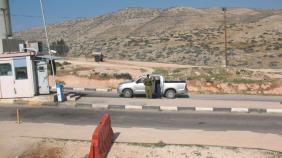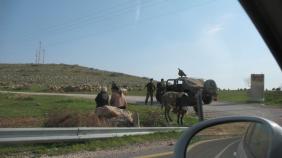Hamra (Beqaot), Tayasir
12:00 We went through Bezeq checkpoint.
We stopped at Hamam el Malih junction before the road up to the Tayasir checkpoint in order to give clothing and blankets to a family who used to live south of the road, and now lives north of it after the state of Israel has destroyed their homes. A military pickup truck, protected by bars, stops on the road next to us, they order us to place a warning triangle on the ground, etc. The army eventually left and we completed our errand.
12:30 Tayasir checkpoint

Contrary to the struggles we've had with the soldiers on our previous visits, this time we were greeted cordially. They asked how we were, requested that we not photograph, offered us something to drink and one soldier (a new immigrant from France) came over to find out who we are and to tell us about himself (a fervent Zionist, relatively old to be in the Kfir brigade, believes in the need to protect and maintain the borders of the promised land…).
The herd of cows enjoys the green vegetation and is grazing at the abandoned army base. The pupils’ minibus crossed back and forth two or three times. Small trucks, large trucks, also taxis. The taxi drivers present to the soldiers bundles of their passengers’ ID cards, which are returned after a superficial glance. Drivers are asked: Whither? Whence? Why? Trunks are checked. The soldier tells us traffic is heaviest between 5-6 AM and in the afternoon.
13:15 We left.
Alon Road 578
The dirt berm along the road is an important reminder to anyone who may be confused by the enticing greenery around us, the flocks of sheep calmly grazing, and the hillsides covered with blossoming branched asphodels.
13:40 Hamra checkpoint
.jpg)
Here they tried to chase us away, unlike the soldiers’ indifference to us on previous visits.
As soon as we arrived we saw a line of ten vehicles to the east, which within minutes increased to 16, and then intermittently shortened and lengthened while we were there. We timed them: a bus waited 20 minutes, others 15; someone yelled to us, “What’s going on? There are little children here, sick people, what’s taking so long?” The bus driver shouted to us that it’s like this every day, every ssingle day. Cars are let through slowly; sometimes people get out for inspection.
A soldier inquires, responds witn an “Aha” when he hears "Machsom Watch". A Mazda pickup truck with Israeli license plates arrives from Area A. Two soldiers (one with a pointed gun, the other in a DCO vest) asked us to move: "You’re interfering with our work." “I’m asking you to leave so I won’t have to call the police…you’re interfering with the conduct of military activity.” After our backs were already turned as we walked toward the lengthening line, we heard him say “…the two older women are here, being very cool, leisurely – should I…???” He stopped. Maybe he waited for an answer, or maybe he just got tired of showing off .
14:15 After the soldiers sent the cars to two lanes and hastened the inspections the line shortened and the crossing went more quickly – but it’s still a checkpoint!!
14:25 We left.

14:40 Near the settlement of Ro’i we saw two seated women holding a chained donkey. Sheep grazed in the field. The calm scene was disturbed by a military vehicle and armed soldiers surrounded them. Our attempts to speak with the soldiers were met with a flow of abuse and nonsense, like “You’re leftists; I’m tired of all your bullshit…” They point to the sign reading “Firing range” as sufficient reason for detaining the women. We telephoned Chana, asked her to tell someone at the DCO/the Civil Administration they were detained. The women waved to us, as if asking us to stay. We waited. The military security coordinatorfrom Ro’i settlement arrived as well (earlier we’d seen him repairing a fence at the settlement). He also taught us a chapter on protecting the homeland and the implications of interfering with the defense forces. We realized they (and also we) were waiting for the police car.
they were detained. The women waved to us, as if asking us to stay. We waited. The military security coordinatorfrom Ro’i settlement arrived as well (earlier we’d seen him repairing a fence at the settlement). He also taught us a chapter on protecting the homeland and the implications of interfering with the defense forces. We realized they (and also we) were waiting for the police car.
15:10 The shepherdesses and flock were released (we weren’t able to determine whether they were fined). The three policemen from Ma’aleh Efrayim, acquaintances from past shifts, told us we shouldn’t park on the roadside.
15:20 We dropped off blankets and winter clothing at Halat Makhoul.
15:50 We crossed through the Bezeq checkpoint.
